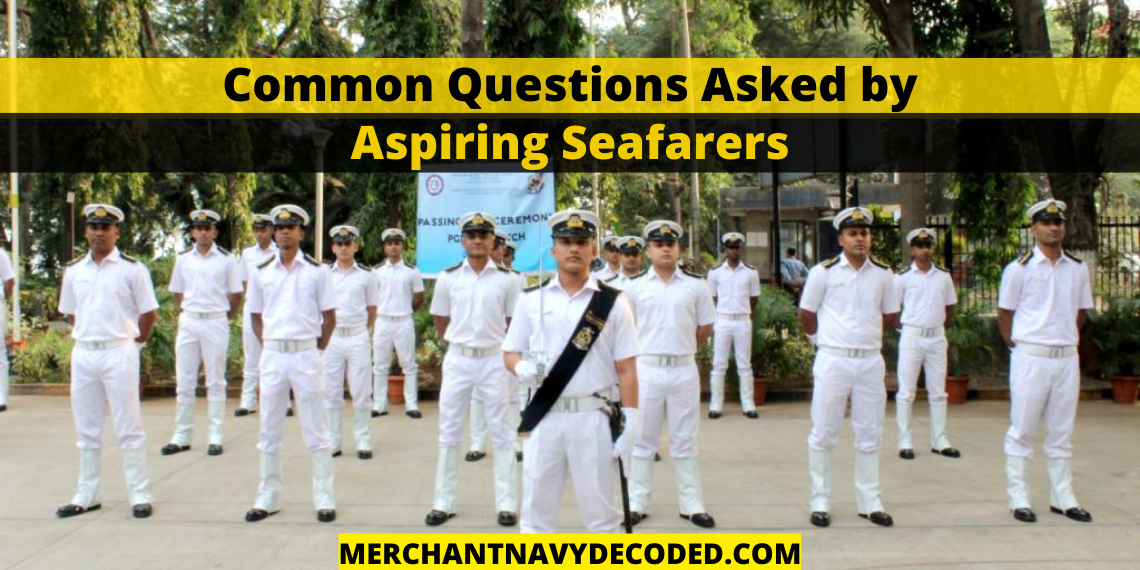Common Questions Asked by Aspiring Seafarers
One of the most difficult choices that teenagers face in their lives is choosing the right profession or career for themselves. This choice of theirs can define their whole lives, so it better be a good one. In recent years with increasing competition, the pressure that teenagers face while choosing the correct career option for themselves is more than ever.
One has to go through every single piece of information about the field of work they want to pursue for the rest of their lives, one has to know about the nature of work, career growth prospects, top companies associated with the particular field, etc. So, it is not an easy choice to make especially when you know that your entire future depends on this single decision.
This whole process is even more difficult for a profession like Merchant Nay which has a lot of myths and misconceptions associated with it rather than actual facts. Genuine information related to this field is very rare to find, the majority of sites on the internet are just advertisements for below-average maritime colleges, that are continuously looking for desperate students to rob them of their hard-earned money.
That is why it is really important to do thorough research and not trust any random website on the internet blindly. It is recommended that if you want any information regarding the shipping industry, you should visit DG Shipping’s official website where you will find genuine information about the maritime sector in our country.
In this blog, we list some of the most common questions asked by aspiring seafarers who want to know a bit more about this profession.
1. Do seafarers get paid while they’re at home? If not then how do they manage their expenses?
This is one of the most common questions asked by young students who want to pursue a career at sea. Most shipping companies do not pay you, while you’re at home. Most of these are ship management companies that work on a contractual basis and pay you only for the duration of the contract that you complete onboard their vessel. However, there are some good ownership companies such as Maersk, Chevron, Shell, British Petroleum, etc., that pay their employees round the year even when they’re at home. They have shorter contracts, 4 months onboard and 2 months off. However, the promotions are really slow in these companies.
But, this doesn’t mean that the seafarers working in ship management companies face any shortage of money. They are very well compensated during the duration of their contract and make enough money, sometimes even more than the annual salaries of top IT company employees.
2. Are seafarers jobless for 6 months after completing their contract onboard?
This is a misconception that a majority of people share in our country. In Merchant navy most companies offer contracts of 6 months to their junior officers and of 4 months to the senior officers. When seafarers sign off from a vessel after completing their agreed contracts, it is completely up to them after how long they want to join back. They can give their notice of readiness to the company whenever they are ready to join back, and they will be on board within a month of giving readiness. But since most seafarers make a sufficient amount of money in their contract of 6 months, hence they take long vacations of 4 – 6 months before they join back on a vessel.
There is no other profession that offers such a long vacation to its employees. This is actually a huge advantage for seafarers, many of them use this extended time off to pursue their other interests, and passions or maybe set up a business.
3. Are seafarers able to visit the ports and travel around the city?
Yes, seafarers are given “shore passes” whenever their ship reaches a port. But in recent times due to covid restrictions, most countries do not allow crew members to disembark from the ships. Once these restrictions are lifted then hopefully seafarers will be allowed to disembark. It also depends on the type of vessel you’re sailing in, seafarers sailing on bulk carriers enjoy long port stays and hence get a lot of shore leaves. Whereas seafarers working on tankers get very limited opportunities to disembark from their vessel due to the busy schedule and short port stays.
4. Is alcohol and smoking allowed on board ships?
Smoking is allowed on all vessels. Ships have designated smoke rooms where crew and officers can smoke. Cigarettes are easily available in the bond store of the ship, from where seafarers can buy and smoke as much as they want. However, there are restrictions on alcohol in some vessels and companies. Especially, on Tankers (Oil/Chem/Gas) alcohol is strictly prohibited. Surprise alcohol tests are conducted onboard tankers, seafarers can even get sacked if they fail this test. Some companies even have a ZERO alcohol policy, which means that they do not tolerate the consumption of alcohol onboard their vessels.
5. What is the nature of work onboard?
Merchant Navy is a very dynamic profession, you’re expected to be the Jack of all trades, your skills and knowledge should not just be limited to one thing. As a first-time Deck cadet or Trainee marine engineer, your primary responsibility is to assist the senior officers and engineers in their respective duty. You are expected to take initiative and learn the duties and jobs of your seniors as soon as possible so that you can be an asset to the team. As a deck cadet, you will be asked to assist your senior officers in bridge watchkeeping, cargo operations, ballasting/de-ballasting, etc. Trainee marine engineers are expected to assist the senior engineers in Engine room watches and routine maintenance of machinery.
6. Is Merchant Navy a risky profession?
Yes, it is a very risky profession and you will encounter many hazards on a daily basis while working on merchant vessels. But, can you single out one thing from your daily routine that doesn’t involve any risk? Even the most basic of tasks such as crossing a road involves many risks. In the same way, working onboard is also not easy and sometimes you will have to work in an environment that involves a considerable amount of risk to your health and life. But you will be properly trained to handle such tasks. All that is required of you is to stay alert and aware at all times, and you will never encounter an accident in your life.
7. How much is the waiting period after course completion?
The waiting period completely depends on the market situation and the company that you’re sponsored by. Some companies like Anglo Eastern, Synergy, Scorpio, etc., have really less waiting periods of around 3 – 6 months, while companies like Great Eastern, Executive Ship Management, Fleet management, etc., can make you wait for more than a year before you go onboard.
8. How much time does it take to become a Chief Engineer/Captain?
This completely depends on your hard work and your appraisals onboard. Sometimes it also depends on the company that you’re sailing with as some companies encourage early promotions while some take time to promote their officers. But on average, it takes around 8 – 10 years to become a Chief Engineer/Captain from a Deck Cadet/Trainee Marine Engineer.
In this blog we covered some of the most asked questions by aspiring seafarers, we are also aware of the fact that we might have missed some questions too. Let us know in the comments section if you have some more questions, and we will try our best to answer them all.
“Remember to look up at the stars, not down at your feet. Try to make sense of what you see and wonder about what makes the universe exist. BE CURIOUS.”
Stephen Hawking
Disclaimer :- The opinions expressed in this article belong solely to the author and may not necessarily reflect those of Merchant Navy Decoded. We cannot guarantee the accuracy of the information provided and disclaim any responsibility for it. Data and visuals used are sourced from publicly available information and may not be authenticated by any regulatory body. Reviews and comments appearing on our blogs represent the opinions of individuals and do not necessarily reflect the views of Merchant Navy Decoded. We are not responsible for any loss or damage resulting from reliance on these reviews or comments.
Reproduction, copying, sharing, or use of the article or images in any form is strictly prohibited without prior permission from both the author and Merchant Navy Decoded.




I’m gp rating student,,I’m not perfect in English,,any problems of sailing…
Hi swaroop, hope you doing well.
We will recommend you to start working on your communication skills because on ship, you will be working with multinational crew so you should be able to understand the common English.
do watch this video, it will surely help you in improving your communication skills.
https://youtu.be/lxLOm73UFoY
– TEam merchnat navy decoded
Hey bro… English language is just only for communication… This job needs a plenty of hardwork..if you are not good at this it’s ok.. Your hardwork matters.
Great one 🙌🙏
Much thanks Ishika.
Sir in Your previous videos and vlogs you have mentioned that Fleet Management have very less waiting period ? Is it risen now? Pardon for english
Hey Ankur, right now, Fleet Management has very less waiting period, you just need to have your documents completed and you will be onboard within a month or two. If you want to join Fleet Management, it can be a good option for you.
Sir, which good company right now has least waiting period for engine cadets. Seems like the list keep changing.
Hey Adity, in terms of B.Tech, MSC and MAERSK are good to go and if you are a GME student then Anglo Easter, Wilhelmsen, and V Ships should be your target.
Waiting period of chevron ?
Hi Yash, for which course do you this information.